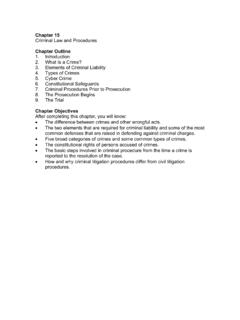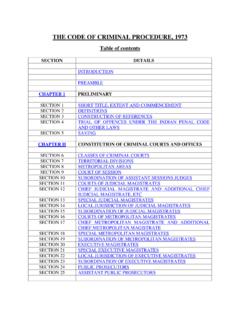Transcription of Pakistan: Code of Criminal Procedure, 1898 as amended by ...
1 The Asian Development Bank and the Organisation for Economic Co-operation and Development do not guarantee the accuracy of this document and accept no responsibility whatsoever for any consequences of its use. This document was obtained in September 2007. ADB/OECD Anti-Corruption Initiative for Asia Pacific September 2007 Pakistan: Code of Criminal Procedure, 1898 as amended by Act 2 of 1997 THE CODE OF Criminal PROCEDURE, 1898 (Pakistan) As amended by Act II of 1997 PART I - PRELIMINARY - CHAPTER I 1. Short title and commencement. (1) This Act may be called the Code of Criminal Procedure, 1898, and It shall come Into force on the first day of July, 1898. (2) It extends to 1 [the whole of Pakistan] but, in the absence of any specific provision to the contrary, nothing herein contained shall affect any special or local law now in force, or any special jurisdiction or power conferred, or any special form of procedure prescribed, by any other law for the time being in force.
2 2. [Repeal of enactments, notifications, etc, under repealed acts pending cases] Rep. by the Repealing and Amending Act, 1914 (X of 1914). 3. Reference to Code of Criminal Procedure and other repealed enactments. (1) In every enactment passed before this Code comes into force in which reference is made to, or to any, chapter or section of the Code of Criminal Procedure, Act XXV of 1861 or Act X of 1872, or Act X of 1882 or to any other enactment hereby repealed, such reference shall, so far as may be practicable, be taken to be made to this Code or to its corresponding chapter or section. (2) Expressions in former acts . In every enactment passed before this Code comes into force the expressions 'Officer exercising (or 'having') the powers (or 'the full powers') of a Magistrate' 'Subordinate Magistrate, first class', and 'Subordinate Magistrate second class', shall respectively be deemed to mean 'Magistrate of the first class', 'Magistrate of the second class' and 'Magistrate of the third class', the expression 'Magistrate of a division of a district shall be deemed to mean 'Sub-Divisional Magistrate', the expression 'Magistrate' of the district shall be deemed to mean 'District Magistrate and the expression 'Joint Sessions Judge' shall mean 'Additional Sessions Judge'.
3 4. Definition. (1) In this Code the following words and expressions have the following meanings unless a different intention appears from the subject or context: (a) 'Advocate-General'. 'Advocate-General' includes also a Government Advocate or where there is not Advocate-General or Government Advocate, such officer as the Provincial Government may, from time to time, appoint in this behalf; (b) 'Bailable offence', 'Non-bailable offence'. 'Bailable offence' means an offence shown as bailable in the second schedule, or which is made bailable by any other law for the time being in force; and 'non-bailable offence' means any other offence: (c) 'Charge'. 'Charge' includes any head of charge when the charge contains more heads than one: (d) [Rep. by the Repealing and amending Act, 1923 (Act XI of 1923)} (e) [Omitted by Law Reforms Ordinance, 1972}. Pakistan: Code of Criminal Procedure 1898 2 ADB/OECD Anti-Corruption Initiative for Asia Pacific September 2007 (f) 'Cognizable offence'.]]
4 Cognizable case'. 'Cognizable offence' means an offence for, and 'cognizable case' means a case in, which a police officer, may, in accordance with the second schedule or under any law for the time being in force, arrest without warrant; (g) Omitted by 1949. (h) 'Complaint'. 'Complaint' means the allegation made orally or in writing to a Magistrate, with a view to his taking action under this Code, that some person whether known or unknown, has committed an offence, but it does not include the reports of a police-officer; (i) Omitted by Act II of 1950. (j) 'High Court'. 'High Court' means the highest Court of Criminal appeal or revision for a Province: (k) 'Inquiry'. 'Inquiry' includes every inquiry other than a trial conducted under this Code by a Magistrate or Court; (l) 'Investigation'. 'Investigation' includes all the proceedings under this Code for the collection of evidence conducted by a police-officer or by any person (other than a Magistrate) who is authorized by a Magistrate in this behalf; (m) 'Judicial proceeding'.
5 'Judicial proceeding' includes any proceeding in the course of which evidence is or may be legally taken on oath; (n) 'Non-cognizable offence': 'Non-cognizable case'. 'Non-cognizable offence means an offence for, and 'non-cognizable case' means a case in, which a police officer, may not arrest without warrant; (o) 'Offence', 'Offence' means any act or omission made punishable by any law for the time being in force; it also includes any act in respect of which a complaint may be made under section 20 of the Cattle Trespass Act, 1871. Offence- The word 'offence' as defined in the Code means any act or omissions made punishable by any law for the time being enforced apart those from under PPC. 1991 1476 (Ind). An offence is constituted as soon as the act which constitute that offence have been committed. It remains an offence whether it is triable by a Court or not and the fact that the trial of the offence can only be taken up after certain specified conditions are fulfilled does not make it any the less an offence.
6 AIR 1967 528. There is nothing wrong in law to regard a single act of firing at two persons as one offence. AIR 1952 45. However, an act or omission is an offence only if it is made punishable by any law for the time being in force 1931 94. (p) 'Officer in charge of a police-station'. 'Officer in charge of a police-station' includes, when the officer in charge of the police-station is absent from the station-house or unable from illness or other cause to perform his duties, the police-officer present at the station-house who is next in rank to such officer and is above the rank of constable or, when the Provincial Government so directs, any other police-officer so present; (q) 'Place'. 'Place' includes also a house, building, tent and vessel: (r) 'Pleader'. 'Pleader', used with reference to any proceeding in any Court, means, a pleader or a mukhtar authorized under any law for the time being in force to practice in such Court, and includes (1) an Pakistan: Code of Criminal Procedure 1898 3 ADB/OECD Anti-Corruption Initiative for Asia Pacific September 2007 advocate, a vakil and an attorney of a High Court so authorized, and (2) any other person appointed wit the permission of the Court to act in such proceeding; Pleader- With reference to any proceedings in the Court a pleader means a pleader or Mukhtar authorised under law for the time being in force and includes: (1) An advocate; (2) A vakeel or any attorney of High Court so authorised; (3) Any other person appointed with the permission of the Court.
7 A co-accused can act as pleader if so permitted. AIR 1962 Pat 244. Private person must get the prior permission. 1991 2425. The discretion of the Court in permitting person to appear as 'pleader' must be exercised judicially with due regard to the interest of the party engaging him. AIR 1978 1019; 1978 778. A power of attorney authenticated by fail authorities is a valid document. 1991 25. A constituted attorney can appear for the accused. 1991 2425. (s) 'Police-station'. 'Police-station' means any post or place declared generally or specially, by the Provincial Government to be a Police Station and includes any local area specified by the Provincial Government in this behalf: Police station-Police station is a place declared generally or specifically by the provincial Government to be a police station and includes any local area so specified except a beat-house.
8 AIR 1960 Cal 519. Does not include vehicle. (1963) 3 SCR 386. Detention in a tee other than notified is illegal. PLD 1965 Lah 324. (t) 'Public Prosecutor'. Public Prosecutor' means any person appointed under section 492, and includes any person acting under the directions of a Public Prosecutor and any person conducting a prosecution on behalf of the State in any High Court in the exercise of its original Criminal jurisdiction: Public prosecutor-Public Prosecutor means any person appointed u/s. 492 and includes Assistant Public Prosecutor and any person conducting prosecution under Public Prosecutor. PLD 1960 Dacca 783. He is bound to assist the Court with his fairly considered view and the Court is entitled to have the benefit of the fair exercise of his function. AIR 1957 389. Government advocate under instructions of the Advocate General who is appointed u/s 492 to be Public Prosecutor for all cases in the High Court is a Public Prosecutor.
9 1966 Raj. Law Weekly 300; 1981 Cr. R. 301. Additional Government Advocate appointed as a public Prosecutor is a Public Prosecutor lawfully empowered to present appeal in the High Court against orders of acquittal. AIR 1971 1977. A private pleader instructed by a private party will not be permitted to conduct prosecution. 1991 Mad. Cr. 624. (u) 'Sub-division'. 'Sub-division' means a sub-division of a district. [Clauses (v) and (w) of Subsection (1) of Section 4 omitted by Law Reform Ordi. 1972.] Province of Punjab Omission of clauses (e) (v) & (w) by Law Reforms Ordinance 1972. item No. 1 enforced vide No. Judl. 1-3(2)/75 dated (2) Words referring to acts . Words which refer to acts done, extend also to illegal omission; and Pakistan: Code of Criminal Procedure 1898 4 ADB/OECD Anti-Corruption Initiative for Asia Pacific September 2007 Words to have same meaning as in Pakistan Penal Code.
10 All words and expression used herein and defined in the Pakistan Penal Code, and not hereinbefore defined, shall be deemed to have the meanings respectively attributed to them by the Code. 5. Trial of offences under Penal Code. (1) All offences under the Pakistan Penal Code shall be investigated, inquired into, tried, and otherwise dealt with according to the provisions hereinafter contained. (2) Trial of offences against other laws. All offences under any other law shall be investigated, inquired into, tried, and otherwise dealt with according to the same provisions, but subject to any enactment for the time being in force regulating the manner or place of investigating, inquiring into, trying or otherwise dealing with such offences. PART II - CONSTITUTION AND POWERS OF Criminal COURTS AND OFFICES - CHAPTER II - OF THE CONSTITUTION OF Criminal COURTS AND OFFICES A.



















